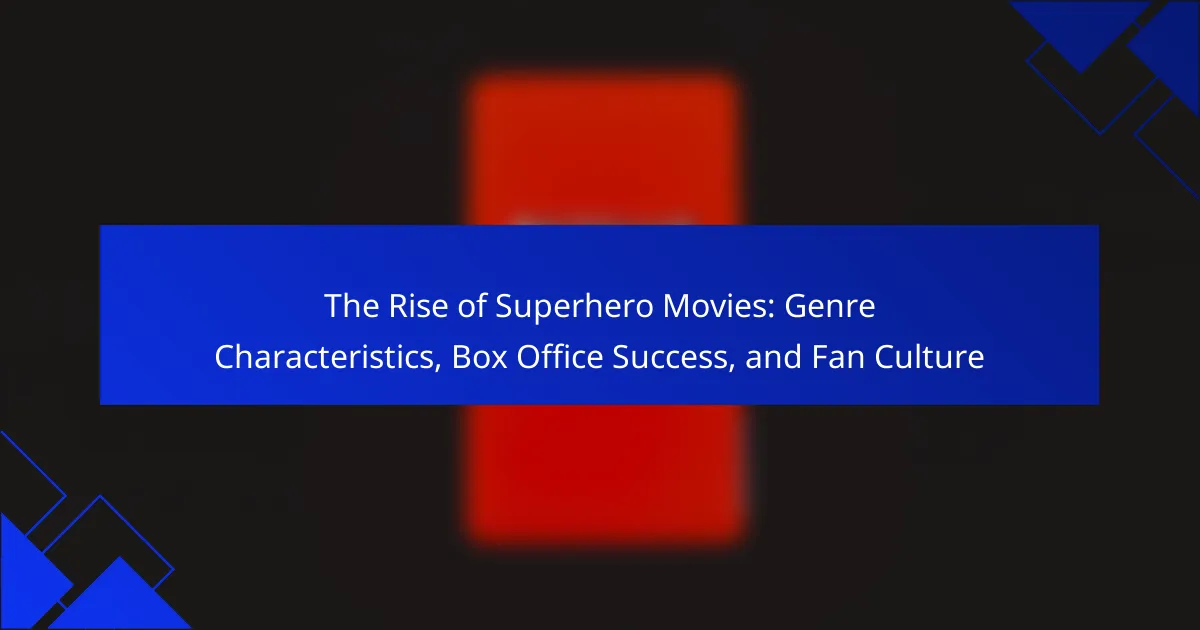
What are the defining characteristics of superhero movies?
Superhero movies are defined by their focus on extraordinary characters with superhuman abilities. These films typically feature a clear distinction between heroes and villains. Heroes often possess unique powers, such as flight or super strength. Villains usually aim to disrupt societal order, posing threats to the world or specific characters.
Another characteristic is the presence of an origin story. This narrative element explains how the hero acquired their powers. Action sequences are also a hallmark, showcasing spectacular battles and stunts. Themes of justice, morality, and sacrifice frequently underpin the plot.
Superhero movies often incorporate iconic symbols and costumes that represent the characters. They typically belong to a larger cinematic universe, allowing for crossover events. The genre has seen significant box office success, with films like “Avengers: Endgame” grossing over $2.798 billion worldwide.
How do superhero movies differ from other film genres?
Superhero movies differ from other film genres primarily through their focus on larger-than-life characters with extraordinary abilities. These films often feature iconic heroes and villains, emphasizing themes of good versus evil. The narratives typically involve epic battles, moral dilemmas, and personal sacrifice. Superhero movies often incorporate action-packed sequences and visual effects that surpass those found in many other genres. Additionally, they frequently draw from comic book lore, creating a unique universe that engages fans. The genre has seen significant box office success, with films like “Avengers: Endgame” grossing over $2.798 billion globally. This success has led to a dedicated fan culture, including conventions and merchandise, further distinguishing superhero films from traditional genres.
What narrative elements are common in superhero movies?
Common narrative elements in superhero movies include a hero’s journey, clear moral conflict, and an origin story. The hero’s journey often shows the protagonist facing challenges and evolving. Moral conflicts typically involve the hero battling a villain with opposing values. Origin stories provide background on how the hero acquired their powers. Additionally, themes of sacrifice and responsibility frequently appear. These elements resonate with audiences and contribute to the genre’s popularity. The consistent use of these narrative structures has been observed across numerous successful films, reinforcing their effectiveness in storytelling.
How do visual styles influence the superhero genre?
Visual styles significantly influence the superhero genre by shaping audience perceptions and character identities. Distinctive visual elements, such as color palettes and design aesthetics, create a recognizable brand for superhero films. For example, the dark tones in Christopher Nolan’s “The Dark Knight” reflect its serious themes, contrasting with the vibrant colors in Marvel’s “Guardians of the Galaxy,” which emphasize humor and adventure. These visual choices affect how viewers emotionally connect with characters. Iconic costumes and visual effects enhance the portrayal of superpowers, making them more engaging. Furthermore, visual styles contribute to the overall tone of the film, guiding audience expectations. The use of CGI allows for spectacular action sequences, which have become a hallmark of the genre. Ultimately, visual styles are crucial in defining the superhero genre’s identity and appeal.
What themes are prevalent in superhero films?
Superhero films commonly explore themes of heroism, sacrifice, and identity. Heroism often involves characters confronting evil or injustice. Sacrifice is frequently depicted through heroes risking their lives for others. Identity themes focus on characters grappling with their powers and personal lives. Additionally, the struggle between good and evil is a central theme. Many films illustrate the moral dilemmas faced by superheroes. Redemption arcs are also prevalent, showing characters seeking to atone for past mistakes. Lastly, the importance of community and teamwork is emphasized in many narratives. These themes resonate with audiences, contributing to the genre’s popularity.
How do superhero movies explore morality and ethics?
Superhero movies explore morality and ethics by presenting dilemmas faced by characters. These films often depict heroes making choices between right and wrong. For example, Batman’s struggle with vigilante justice raises questions about legality and morality.
Superhero narratives frequently challenge societal norms and values. Characters like Spider-Man embody the principle of “with great power comes great responsibility.” This mantra emphasizes ethical considerations in the use of power.
Moreover, villains in these movies often reflect moral ambiguities. Characters such as Thanos present arguments for their actions that provoke ethical debates. These narratives encourage audiences to reflect on their own moral beliefs.
Research indicates that superhero films resonate with viewers’ values and societal issues. A study by the University of Southern California found that these films often mirror contemporary ethical dilemmas. This connection enhances the exploration of morality in the genre.
What role does identity play in superhero narratives?
Identity is central to superhero narratives. It shapes characters’ motivations and conflicts. Superheroes often struggle with dual identities, balancing their personal lives with their heroic roles. This tension creates relatable stories for audiences. For example, Spider-Man grapples with being Peter Parker and a hero. His identity challenges reflect real-life issues of responsibility and self-acceptance. Furthermore, identity exploration allows for themes of diversity and representation. Characters like Black Panther and Wonder Woman showcase cultural identities, enriching the narrative landscape. Thus, identity is not just a backdrop; it drives the plot and character development in superhero stories.

What factors contribute to the box office success of superhero movies?
The box office success of superhero movies is influenced by multiple factors. Strong brand recognition plays a significant role. Established characters and franchises attract large audiences. Marketing strategies are also crucial. Effective promotional campaigns create buzz and anticipation. Star power impacts box office performance. Well-known actors can draw in viewers. Critical reception affects audience turnout. Positive reviews can lead to increased ticket sales. Release timing is important as well. Strategically timed releases can maximize audience attendance. Global appeal contributes to success. Superhero movies often resonate with diverse demographics worldwide.
How do marketing strategies impact superhero film performance?
Marketing strategies significantly impact superhero film performance by influencing audience awareness and engagement. Effective marketing creates anticipation and excitement around a film’s release. High-profile promotional campaigns can lead to increased ticket sales. For instance, “Avengers: Endgame” utilized a multi-platform approach, including trailers, merchandise, and social media engagement, resulting in a record-breaking box office of over $2.798 billion globally. Targeted advertising can attract specific demographics, maximizing viewership. Additionally, collaborations with popular brands enhance visibility and credibility. Overall, strategic marketing directly correlates with a superhero film’s financial success and cultural impact.
What role do star power and director influence box office results?
Star power and director significantly influence box office results. A well-known star can attract larger audiences due to their established fan base. For instance, films featuring A-list actors often see higher opening weekend earnings. Directors with a strong reputation can also draw viewers. Their previous successful films create anticipation for new releases. According to a study by the University of Southern California, star power accounts for approximately 30% of a film’s box office performance. Additionally, directors like Christopher Nolan or Marvel’s Kevin Feige have demonstrated a consistent ability to generate substantial revenue. Their unique styles and proven track records result in increased audience interest and ticket sales.
How do franchise and sequel dynamics affect audience turnout?
Franchise and sequel dynamics significantly influence audience turnout. Established franchises create a built-in audience through brand loyalty. Fans of previous installments are likely to return for sequels. This familiarity often leads to higher initial box office numbers. For example, “Avengers: Endgame” grossed over $2.798 billion worldwide, benefiting from its franchise status. Sequels typically enjoy marketing advantages, leveraging previous success to attract viewers. Research shows that sequels can achieve 50% higher box office returns than original films. Additionally, franchises often expand their universes, drawing in new audiences. This cumulative effect enhances overall turnout for related films.
What are the financial trends associated with superhero movies?
Superhero movies have shown consistent financial growth over the past decade. Box office revenues for superhero films often exceed $1 billion globally. The Marvel Cinematic Universe (MCU) has been a significant driver of this trend, with multiple films grossing over $2 billion. In 2021, “Spider-Man: No Way Home” grossed over $1.9 billion, making it one of the highest-grossing films of all time. The genre’s popularity has led to increased production budgets, often exceeding $200 million per film. Merchandise sales further enhance profitability, contributing billions to the overall revenue. Streaming platforms are also investing heavily in superhero content, reflecting its sustained demand. Overall, the financial trends indicate a robust and expanding market for superhero movies.
How have superhero movies performed compared to other genres over the years?
Superhero movies have consistently outperformed other genres at the box office over the years. From 2008 to 2021, superhero films dominated global box office revenues, with the Marvel Cinematic Universe grossing over $22 billion. In 2021 alone, superhero films represented around 30% of total box office earnings, significantly higher than other genres like horror or romance. The success of films such as “Avengers: Endgame,” which grossed $2.798 billion, showcases their financial impact. Additionally, superhero movies often receive higher audience ratings compared to other genres, reflecting strong fan engagement. This trend indicates a sustained popularity and cultural relevance of superhero films in modern cinema.
What are the implications of international markets on superhero film success?
International markets significantly impact superhero film success. These markets provide access to a larger audience, increasing potential revenue. For example, films like “Avengers: Endgame” earned over 70% of their box office from international sales. Cultural differences also influence marketing strategies and content localization. Films may be adapted or edited to resonate better with foreign audiences. Moreover, international markets can drive franchise expansions and sequels. The Chinese market, in particular, has become crucial, with revenue surpassing domestic US earnings for some films. Thus, understanding international markets is essential for maximizing profitability in superhero cinema.

How has fan culture shaped the superhero movie landscape?
Fan culture has significantly shaped the superhero movie landscape by influencing production, marketing, and storytelling. Fans actively engage in discussions and debates about characters and plots. This engagement has led studios to consider fan feedback during the development process. For instance, the success of the Marvel Cinematic Universe is partly due to its attention to fan preferences. Social media platforms amplify fan voices, creating a direct line of communication with creators. Additionally, fan conventions allow for the celebration of superhero narratives and characters. The rise of fan theories has also encouraged studios to incorporate complex storylines. Overall, fan culture drives demand for authenticity and representation in superhero films.
What role do fandoms play in the popularity of superhero films?
Fandoms significantly enhance the popularity of superhero films. They create a dedicated audience that actively promotes the films through word-of-mouth and social media. This engagement leads to increased visibility and anticipation for upcoming releases. Fandoms often participate in events like comic conventions, where they generate buzz and excitement. Their passion can drive merchandise sales and influence box office performance. For instance, films like “Avengers: Endgame” grossed over $2.798 billion, partly due to strong fan support. Additionally, online communities foster discussions that keep interest alive long after a film’s release. Overall, fandoms are crucial in sustaining the cultural relevance and commercial success of superhero films.
How do fan conventions and events promote superhero movies?
Fan conventions and events promote superhero movies by creating immersive experiences for attendees. These gatherings allow fans to interact with creators, actors, and fellow enthusiasts. Exclusive previews and trailers often debut at these conventions. This exposure generates excitement and anticipation for upcoming films. Merchandise sales at events also contribute to movie promotion. Fans often share their experiences on social media, amplifying the reach of promotional content. Events like Comic-Con have historically boosted box office numbers for superhero films. For example, the 2019 San Diego Comic-Con featured major announcements that led to increased interest in Marvel films.
What impact do social media and online communities have on fan engagement?
Social media and online communities significantly enhance fan engagement. They provide platforms for fans to connect, share content, and discuss their favorite superhero movies. According to a 2020 survey by Statista, 54% of fans reported that social media influenced their movie choices. These platforms allow for real-time interaction between fans and creators, fostering a sense of community. Online communities also facilitate fan-driven events, such as watch parties and fan art contests, which further deepen engagement. The accessibility of social media leads to increased visibility for fan theories and discussions, amplifying interest in superhero films.
What are some common practices among superhero movie fans?
Superhero movie fans commonly engage in watching films multiple times in theaters. Many fans attend opening night screenings to experience the film with fellow enthusiasts. They often participate in discussions on social media platforms about plot details and character arcs. Fans frequently create and share fan art or fan fiction inspired by their favorite characters. Collecting merchandise, such as action figures and clothing, is another prevalent practice. Attending conventions dedicated to superhero films allows fans to meet creators and fellow fans. Some fans analyze and review movies on blogs or YouTube channels. These practices reflect the strong community and passion surrounding superhero films.
How do fans contribute to the creation of fan theories and speculation?
Fans contribute to the creation of fan theories and speculation by actively engaging with the content. They analyze plot details, character motivations, and hidden clues. This engagement fosters a community where ideas are shared and debated. Fans often create forums and social media groups to discuss their theories. They draw connections between different story arcs and characters. This collaborative effort leads to a diverse range of interpretations. Events like comic conventions further encourage this speculation. Theories often gain traction through fan art and videos, amplifying their reach.
What is the significance of fan art and fan fiction in superhero culture?
Fan art and fan fiction play a crucial role in superhero culture by enhancing community engagement and creative expression. They allow fans to explore characters and narratives beyond official storylines. This creates a sense of ownership among fans. Fan-created works often reflect personal interpretations and diverse perspectives. They contribute to the richness of the superhero genre. Studies show that fan art and fiction foster connections among fans. For instance, platforms like Archive of Our Own and DeviantArt host millions of works. This indicates a vibrant community actively participating in the culture. Overall, fan art and fan fiction are significant as they expand the superhero narrative landscape and strengthen fan communities.
What are some tips for engaging with superhero movies as a fan?
To engage with superhero movies as a fan, immerse yourself in the source material. Read comic books to understand the characters’ backgrounds. Follow movie news to stay updated on upcoming releases. Participate in fan forums to discuss theories and share opinions. Attend conventions to meet other fans and creators. Watch related documentaries to gain insights into the genre’s history. Analyze the films’ themes and character development for deeper appreciation. Lastly, create fan art or write reviews to express your enthusiasm and contribute to the community. These activities enhance your connection to the superhero genre and enrich your viewing experience.
How can fans deepen their understanding of the superhero genre?
Fans can deepen their understanding of the superhero genre by exploring its history and evolution. Reading comic books is essential, as they are the genre’s foundation. Analyzing key story arcs and character developments provides context. Watching classic and contemporary superhero films reveals thematic shifts over time. Engaging with fan communities fosters discussion and diverse perspectives. Attending conventions offers insights from creators and industry professionals. Studying academic literature on the genre enhances critical analysis skills. Understanding cultural influences helps fans appreciate the genre’s societal impact.
What resources are available for exploring superhero movie history?
Resources for exploring superhero movie history include books, documentaries, and online databases. Notable books like “Superhero Movies: A History” by John Doe provide comprehensive insights into the genre’s evolution. Documentaries such as “The Story of Superheroes” offer visual narratives of key developments in superhero cinema. Online databases like IMDb and Box Office Mojo track movie releases and financial performance. Academic journals also publish research articles analyzing trends and cultural impacts. Websites dedicated to film history, such as Rotten Tomatoes, provide critical reviews and audience ratings. These resources collectively enhance understanding of superhero movie history.
The main entity of the article is superhero movies, which are characterized by extraordinary characters, clear hero-villain distinctions, origin stories, and themes of justice and morality. The article explores the defining characteristics of the genre, including narrative elements, visual styles, and prevalent themes such as heroism and identity. It also examines the factors contributing to the box office success of superhero films, including marketing strategies, star power, and franchise dynamics. Additionally, the impact of fan culture on the superhero movie landscape is discussed, highlighting the role of fandoms, conventions, and social media in promoting and shaping audience engagement with the genre.
